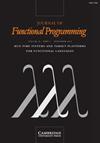ANF preserves dependent types up to extensional equality
IF 1.1
3区 计算机科学
Q4 COMPUTER SCIENCE, SOFTWARE ENGINEERING
引用次数: 2
Abstract
Abstract Many programmers use dependently typed languages such as Coq to machine-verify high-assurance software. However, existing compilers for these languages provide no guarantees after compiling, nor when linking after compilation. Type-preserving compilers preserve guarantees encoded in types and then use type checking to verify compiled code and ensure safe linking with external code. Unfortunately, standard compiler passes do not preserve the dependent typing of commonly used (intensional) type theories. This is because assumptions valid in simpler type systems no longer hold, and intensional dependent type systems are highly sensitive to syntactic changes, including compilation. We develop an A-normal form (ANF) translation with join-point optimization—a standard translation for making control flow explicit in functional languages—from the Extended Calculus of Constructions (ECC) with dependent elimination of booleans and natural numbers (a representative subset of Coq). Our dependently typed target language has equality reflection, allowing the type system to encode semantic equality of terms. This is key to proving type preservation and correctness of separate compilation for this translation. This is the first ANF translation for dependent types. Unlike related translations, it supports the universe hierarchy, and does not rely on parametricity or impredicativity.ANF保留依赖类型直到外延相等
摘要许多程序员使用依赖类型的语言(如Coq)来对高保证软件进行机器验证。然而,这些语言的现有编译器在编译后和编译后链接时都不能提供任何保证。类型保留编译器保留类型中编码的保证,然后使用类型检查来验证编译的代码,并确保与外部代码的安全链接。不幸的是,标准编译器通行证并没有保留常用(内涵)类型理论的依赖类型。这是因为在更简单的类型系统中有效的假设不再成立,并且依赖于内涵的类型系统对语法变化(包括编译)非常敏感。我们从结构扩展演算(ECC)中开发了一种具有连接点优化的A范式(ANF)翻译,这是一种在函数语言中使控制流显式的标准翻译,具有布尔值和自然数(Coq的代表性子集)的依赖消除。我们的依赖类型目标语言具有相等反射,允许类型系统对术语的语义相等进行编码。这是证明该译本的类型保留和单独编译的正确性的关键。这是第一次对依赖类型进行ANF翻译。与相关翻译不同,它支持宇宙层次结构,不依赖于参数性或不确定性。
本文章由计算机程序翻译,如有差异,请以英文原文为准。
求助全文
约1分钟内获得全文
求助全文
来源期刊

Journal of Functional Programming
工程技术-计算机:软件工程
CiteScore
1.70
自引率
0.00%
发文量
9
审稿时长
>12 weeks
期刊介绍:
Journal of Functional Programming is the only journal devoted solely to the design, implementation, and application of functional programming languages, spanning the range from mathematical theory to industrial practice. Topics covered include functional languages and extensions, implementation techniques, reasoning and proof, program transformation and synthesis, type systems, type theory, language-based security, memory management, parallelism and applications. The journal is of interest to computer scientists, software engineers, programming language researchers and mathematicians interested in the logical foundations of programming.
 求助内容:
求助内容: 应助结果提醒方式:
应助结果提醒方式:


